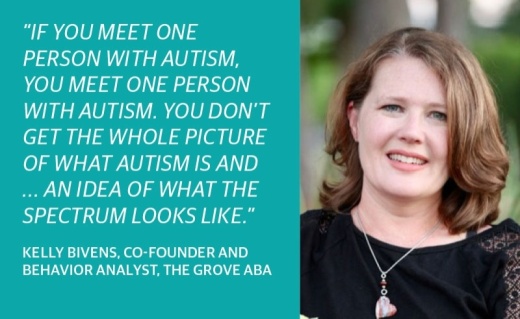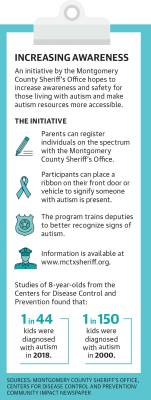The program was created by Moore, whose son was diagnosed with autism at 3 years old. Moore said he saw a need as his son approached driving age to consider how autism may influence interactions with law enforcement.
“They don’t know his diagnosis, or they may think that he is acting suspicious,’’ Moore told The Woodlands Township board of directors at an April 21 meeting.
Identifying the signs
Kelly Bivens, co-founder and behavior analyst for The Grove ABA, which provides Applied Behavior Analysis services to those with autism, said she believes the program is a good start to creating a safe environment for those living with autism.
“It’s a complicated, multifaceted spectrum; it is not enough to describe symptoms of autism, simply because it can look so different from just functioning level,” Bivens said. About 1 out of 44 children in the U.S. are diagnosed with autism, the Centers for Disease and Control and Prevention found in a 2018 study conducted on 8-year-olds. That ratio has risen since 2000, when the rate was 1 in 150.
“Those numbers are growing,” Moore said at the meeting. “That gap is getting smaller every 10 years.”
The MCSO initiative has already seen 25 Montgomery County residents register to receive ribbons identifying their home or vehicle as one where a person with autism is present, according to MCSO Lt. Scott Spencer. Organizations are becoming more reliant on one another to obtain individual care, said Cary Mollinedo, co-founder and director of Texas Autism Academy, a school for autistic children based in The Woodlands.
“The spectrum is a spectrum for a reason; there’s not one pivotal component; it’s a multitude of different characteristics that make up each individual child,” Mollinedo said.
Statewide solutions
State Rep. Steve Toth, R-The Woodlands, said he would be willing to find funding support for the program in the next legislative session.
“This ... came from a need in our community ... and I’m going to try to find dollars for it when I go into session,” Toth said.A 2007 statewide mandate helped ease the economic disparities of these families by requiring medical insurance providers to cover applied behavior analysis, Bivens said. Initiatives like this provide more safety and validity within communities, she said.
“If you meet one person with autism then you meet one person with autism. You don’t get the whole picture of what autism is and ... an idea of what the spectrum looks like across people,” Bivens said.






